Oracle OpenWorld 2017 in Review
By Natalie Evans
October 12, 2017
AI, Blockchain, Cloud, Database 18c, Fn Project, Larry Ellison, Mark Hurd, OpenWorld 2017, Oracle, Thomas Kurian
Many of our readers probably had the opportunity to attend this year’s Oracle OpenWorld 2017. This year it was held in San Francisco at the Moscone Center. Being one of the most important business and technology conference for the past 20 years, hosts tens of thousands of in-person attendees as well as millions online. It’s dedicated to helping businesses leverage Cloud for their innovation and growth, the conference delivers deep insight into industry trends and breakthroughs driven by technology. Oracle used this year's OpenWorld conference to debut a range of AI-powered tools across its ramped up cloud-based offerings.
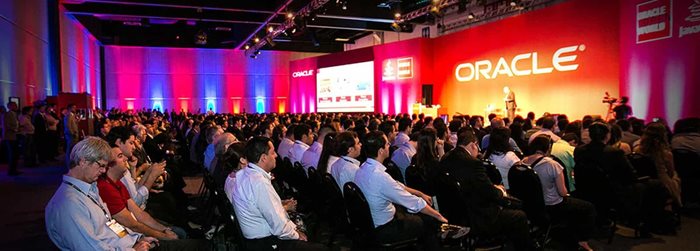
Oracle unveiled nearly a dozen new products and services Monday morning on the second day of Oracle OpenWorld 2017, beefing up some of its cloud application services with new features based on artificial intelligence and introducing a cloud-based blockchain service. Here are the major takeaways from the event.
Container Native App Development Platform
One of the key announcements by Oracle at the conference is the rollout of an opensource platform, known as the Fn Project. It is a container-native serverless platform which can support all programming languages and leverages Oracle's Bare Metal Cloud Services, rolled out last year. The platform can run from anyplace, cloud or on-premise and is designed for high ease and performance. With this roll-out, Oracle says that it has committed to supporting cloud-native, opensource communities.
Digital Innovation Platform for Open Banking
Another key takeaway announcement from the event is Oracle's open framework for banks and financial companies to work together on a common cloud platform. The platform will enable the development of financial technology tools on a single open source platform. According to Oracle, the open banking platform can serve as an agile environment for financial players to perform banking services such as borrowing and paying in a safe manner, in addition to helping the members in their operations using predictive analytics.
Blockchain Cloud Service
Oracle has also announced a new blockchain service under its PaaS capabilities. The service is available on the cloud platform for its customers to build blockchain networks. Customers can easily track products through the supply chain and safely carry out transactions. According to the company, the customers will be empowered to share data securely both in and out of Oracle's cloud environment. The customers will be able to link their inventory and supply chain software to the blockchain service for a secure, distributed data system. “There are not a lot of production-ready capabilities around blockchain for the enterprise. There [hasn’t been] a fully end-to-end, distributed and secure blockchain as a service,” Amit Zavery, Senior VP at Oracle Cloud.
Artificial Intelligence
Oracle has also announced to utilize AI to help developers and provide them a set of tools for tapping into AI capabilities. Under this, Oracle is helping set up a secure and scalable environment for developers to have deep learning models in the cloud. After those deep learning models are trained, developers can incorporate them in the company's PaaS services to create AI-powered applications. The service is also extended to customers for creating their own applications which may include utilizing artificial intelligence.
Automated Database
Oracle’s new announcement, which has caught the attention of the entire IT world is Database 18c. The company has unveiled an autonomous database technology that works on itself to solve problems and prevent downtimes due to corruption. Without any human intervention, the database can patch and update itself to avoid any threat or error.
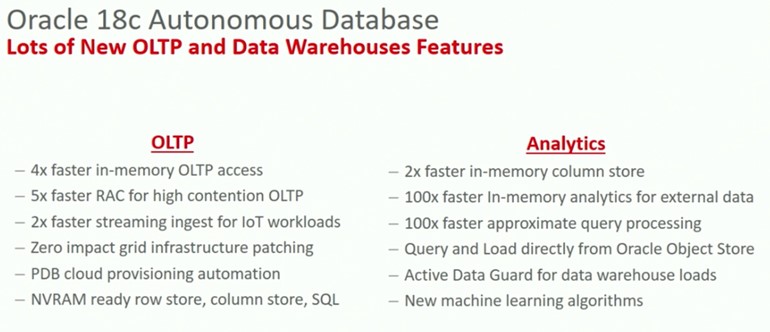
 Mark Hurd CEO of Oracle kicked off the day with a keynote address — delivered behind a desk that appeared to come straight from a nightly talk show — examining the global state of information technology, found some time to read “mean tweets” that criticized Oracle’s approach to the cloud computing revolution. Oracle is definitely the type of legacy enterprise software vendor that early adopters of cloud computing loved to tweak, but there’s no doubt Oracle has committed itself to competing against cloud leaders like Amazon Web Services, Microsoft, and Salesforce across multiple categories of cloud services. “Our strategy is really to build the apps, the platform, and the infrastructure and … make sure we get the apps right first,” Hurd said.
Mark Hurd CEO of Oracle kicked off the day with a keynote address — delivered behind a desk that appeared to come straight from a nightly talk show — examining the global state of information technology, found some time to read “mean tweets” that criticized Oracle’s approach to the cloud computing revolution. Oracle is definitely the type of legacy enterprise software vendor that early adopters of cloud computing loved to tweak, but there’s no doubt Oracle has committed itself to competing against cloud leaders like Amazon Web Services, Microsoft, and Salesforce across multiple categories of cloud services. “Our strategy is really to build the apps, the platform, and the infrastructure and … make sure we get the apps right first,” Hurd said.
Hurd made cloud predictions and discussed the future of business. Oracle customers Bloom Energy, FedEx, and Gap joined Hurd on stage to share how Oracle Cloud innovations are making their businesses more agile, efficient and profitable.
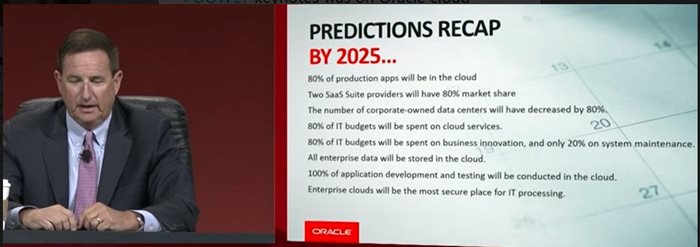
Hurd's key predictions for 2025:
• 100% of application development and testing will be conducted in the cloud.
• 80% of production apps will be in the cloud.
• 80% of IT budgets will be spent on cloud services.
• 80% of IT budgets will be spent on business innovation, and only 20% on system maintenance.
• All enterprise data will be stored in the cloud.
• Enterprise clouds will be the most secure place for IT processing.
Hurd reinforced the success of Oracle's cloud strategy to build the applications, platform and infrastructure that will enable customers to either move to the cloud or start in the cloud. He highlighted the significant expansion of Oracle Cloud, noting that in the last five years, Oracle released 3,500+ SaaS services and 125+ PaaS services making Oracle the most complete cloud in the industry. “The movement to cloud is an inevitable destination,” said Hurd. “This is how computing will evolve over the next several years.” To watch his keyonote address click here.
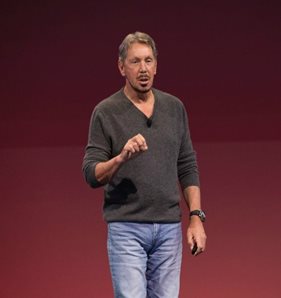 Larry Ellison Oracle Executive Chairman and CTO used the opening keynote of Oracle OpenWorld 2017 to re-announce Oracle’s new autonomous database product, The Oracle 18c Autonomous Database will be available this December, and it’s designed to automate a lot of the painstaking maintenance work required to run a modern database while offering a 99.995 percent uptime guarantee, which works out to 30 minutes of downtime a year, he said.
Larry Ellison Oracle Executive Chairman and CTO used the opening keynote of Oracle OpenWorld 2017 to re-announce Oracle’s new autonomous database product, The Oracle 18c Autonomous Database will be available this December, and it’s designed to automate a lot of the painstaking maintenance work required to run a modern database while offering a 99.995 percent uptime guarantee, which works out to 30 minutes of downtime a year, he said.
“This is the most important thing we’ve done in a long time,” Ellison said. The new database uses machine learning to automate the human labor involved in database maintenance, like patching and tuning, he said.
He also addressed the topic of Cyber Security - Ellison started his keynote with “Companies are losing the cyber war. And it gets worse every year.” Security in the data centers has to be number one priority, not tenth because today companies have to defend themselves against nation-states and very sophisticated cyber criminals who are stealing their data. Today, it can no longer be our people vs their machine, it has to be our computers vs their computers. To watch his keynote address click here.
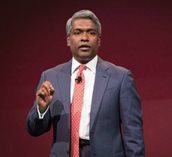 Thomas Kurian, Oracle President of Product Development, showcased game-changing new services and enhancements across the Oracle Cloud Platform. Providing customers a unique advantage, Oracle is the only cloud provider to deliver a complete cloud portfolio, spanning IaaS, PaaS, SaaS and Data as a Service (DaaS). With deep product knowledge, integration, machine learning and artificial intelligence (AI) built into every layer. Kurian demonstrated several of these new services on stage, showing how customers can transform business with Oracle's cloud services. New cloud innovations spanning infrastructure, analytics, data management, and applications showcased. To watch his keynote address click here.
Thomas Kurian, Oracle President of Product Development, showcased game-changing new services and enhancements across the Oracle Cloud Platform. Providing customers a unique advantage, Oracle is the only cloud provider to deliver a complete cloud portfolio, spanning IaaS, PaaS, SaaS and Data as a Service (DaaS). With deep product knowledge, integration, machine learning and artificial intelligence (AI) built into every layer. Kurian demonstrated several of these new services on stage, showing how customers can transform business with Oracle's cloud services. New cloud innovations spanning infrastructure, analytics, data management, and applications showcased. To watch his keynote address click here.
Oracle’s CEO Mark Hurd has predicted that Oracle can win the cloud wars, overcoming the likes of Amazon, Microsoft and Google. Judging by the announcements in the OpenWorld 2017, it seems like they may have a plan in place to actually pull it off. You can watch highlights from the Oracle OpenWorld 2017 on demand here.

Natalie Evans
Natalie Evans has over 16-years in the tech industry and currently works as the event coordinator and tech reporter for CMS-Connected, keeping up-to-date on what's happening in and around the Content Management industry.